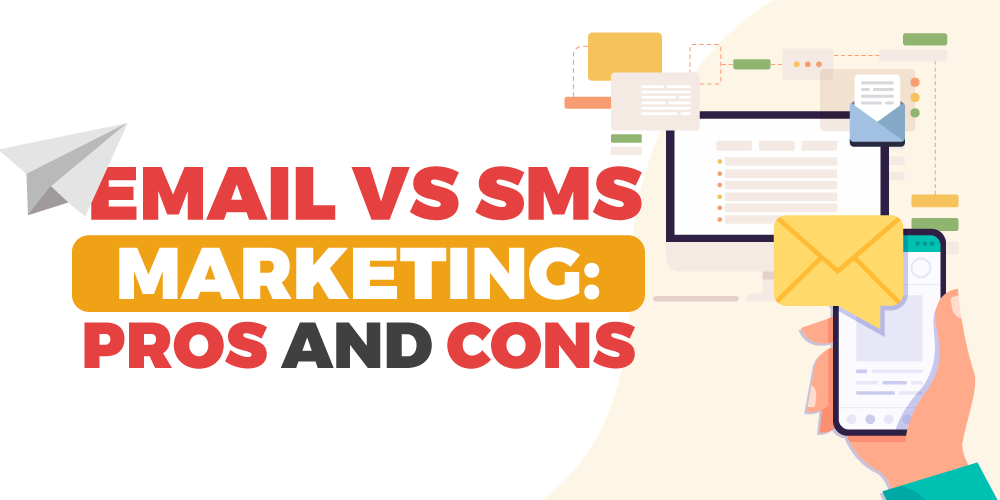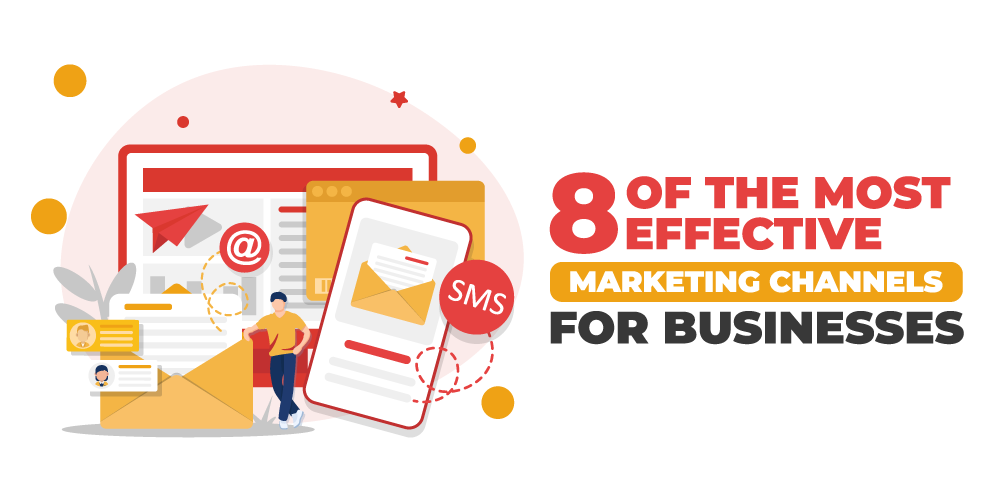The age of information has brought about a host of new ways and channels for you to reach your audience and grow your brand, not to mention the overwhelming feeling you get as you try to figure out where or how to allocate your marketing resources.
“Will SEO generate more ROI than PPC? Should I pull the plug on email marketing and shift to SMS marketing instead?”
Understandably, you want to go for whichever mix has the potential to give the biggest bang for your buck (ROI). But if you try to be active on every channel, you may well be spreading your efforts too thinly and not optimizing your marketing budget.
In this post, we give our take on the most effective marketing channels for your business, so you know which baskets to put your eggs in.

Most Effective B2B Channels
Email will probably never be dislodged from its position as a go-to B2B marketing channel. With email, you can do a myriad of things and get positive results in the way of high open rates, audience reach, and revenue attribution.
And because users don’t become your subscribers until they opt in, you can take it as a signal that they want to learn more about your products or services. By delivering personalized content to targeted accounts, you get to demonstrate the value you can deliver, leading to a relationship based on trust.
Undeniably, B2C and B2B social media marketing don’t operate in the same way. B2C focuses on building brand awareness, driving traffic, and increasing sales, which are all primarily focused on revenue-generation.
On the other hand, B2B social media marketing aims to engage potential partners and provide informative content that they can share within their networks. For B2B marketers, social media can be a valuable tool in building new partnerships and solving customers’ problems.
If Google receives over 8.5 billion searches per day, that’s the number of chances that your brand has for its name to show up on the search engine results pages (SERPs). To put it more realistically, search users will almost always click through the links that appear at the top of the SERPs—which is, of course, where you want to be found.
Your position on SERPs depends on a combination of marketing strategies, which may include search engine optimization (SEO) and content marketing. You need to be creating content that not only highlights your authority and expertise but also allows you to rank for your SEO keywords. Alternatively, you can utilize search engine marketing (SEM) or pay-per-click (PPC) ads to be more visible on search engines.
Customer referrals can drive quality leads for your business. When satisfied customers spread word about their positive experience with your company, product, or service, their contacts are likely to respond more positively simply because referrals are synonymous with credibility.
Since customers who have been referred to you are already willing to buy, it won’t take much of your marketing or sales efforts to get them onboard, meaning a lower customer acquisition cost (CAC) and higher profits.
SMS marketing works in the same way as email marketing, where people are supposed to opt-in to hear from you. However, the advantage of SMS lies in how attached—literally and figuratively—mobile phone users are to their devices. In fact, statistics say that users in the Philippines are most likely to spend at least 90% of the day with their mobile phones at 53% compared to a 41% average across all markets..
SMS marketing applications for your B2B brand are as varied as can be, including delivery of your web content via URL, status notification, and poll invitations, among others. Needless to mention, you’ll need to communicate your message to B2B customers using a more formal and professional language than what you would use for B2C customers.
Most Effective B2C Channels
Social media makes it on the list again as a powerful marketing channel—this time for B2C audiences— because it’s where highly engaged customers are. Social media users are actively searching for brands that their friends like and advocate.
One of the best practices in B2C social media marketing include paid ads, which is how 27% of internet users find brands and products. However, it also pays to simply be active on social media for community building if your goal is to allow customers to get to know you on a more “human” level.
In marketing, storytelling is the strategy for appealing to consumers’ emotions, influencing their purchase decisions, and ultimately, cultivating customer loyalty. Among various content formats, podcasts are arguably the most compelling medium that you can use to incorporate brand messages into your marketing campaigns.
Podcasts allow you to create engaging narratives about your company’s milestones, values, and culture with a lot of creativity as you decide on the theme and topics that will best capture the story that you want to share. Whatever size or type your business is, podcasts provide a venue for you to share your thought leadership in your niche market.
Some years back, the New York Post delved into a research about retail therapy, which is when people shop to improve their mood or emotional state. It should also be known that retail therapy makes up more than a fifth of all shopping purchases among Americans.
If you’re in the retail business, you can utilize point-of-purchase (POP) displays to sell to in-store shoppers whether they’re part of the impulse buyer or practical spender demographic. The rationale here is that POP marketing materials help in highlighting the product that you want to promote, helping shoppers narrow down their choices and make a final decision as to which they should buy.
Having a business website is a must because this is where users go for information about your company, including your contact details, company profile, customer testimonials, and branded content. These things can help you build credibility, make a positive impression with your visitors, and give them a reason to explore your brand. In the same manner, your e-commerce website should include ratings, reviews, or any other type of endorsement that can help boost your business’ social proof.
SMS connects brands and consumers in more ways than one. As a built-in tool or feature found in virtually every mobile phone, SMS lets you communicate with your target audience, which includes 47% of consumers who prefer to reach or be reached by brands through native text messaging. Perhaps this preference has something to do with the idea that when there’s an alternative to face-to-face interactions with businesses, consumers will still choose to communicate via a messaging system.
On the marketing side, SMS is the fastest way to reach customers and get a response at the same time. This can be extremely useful for time-sensitive promotions where a single text lets you direct consumers immediately to your website or app to make a purchase. In case they’re not ready to buy, you can always send reminder texts the next time around for them to come back and finish shopping.
Need Help with SMS Marketing?
Your B2B organization can benefit from marketing channels that have the ability to generate leads, build relationships, improve ROI, and boost revenue for your business. If you’re a B2C brand, you need to choose marketing channels that allow you to facilitate transactional purchases by motivating customers to buy and simplifying the buying process for them.
Although SMS marketing ticks all of these boxes, not too many businesses recognize its potential as a valuable marketing and communication channel. Often, the problem lies not so much on the technology but rather on the way that it’s used.
If you need assistance optimizing returns on your SMS marketing campaigns, contact the bulk SMS experts at Semaphore.
Get the best results with Semaphore’s secure SMS marketing solutions!
Alex built Semaphore’s tech backbone and keeps it running smoothly. With deep experience in tech: Over 20 years in Web Development, IT and Infrastructure; 10+ years management experience in technology; and an expert in enterprise application architecture, development and tech processes, Alex is an old-hat in bridging the gap between geeks and suits as well as applying tech to real-world business problems. Connect with Alex on LinkedIn.



